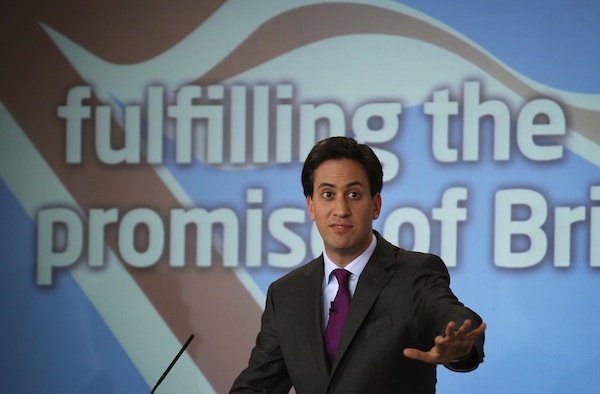So the Prime Minister’s speech is, as James hinted yesterday, going to be on Wednesday, and in London to avoid any further strikes of the Curse of Tutancameron’s Europe speech. His official spokesman confirmed the date this morning.
Thanks to briefed extracts and further briefings over the weekend, we now have a rough outline of what’s going to be in it, which will mean it’s impressive if anything the David Cameron says causes anyone in the audience to gasp with surprise. What is more exciting is what the response will be from the other benches in the Commons.
Labour spokesmen on the broadcast rounds yesterday were squirming rather when asked about whether the party might offer a referendum too. ‘It’s rarely wise in international relations to ever say never,’ said Douglas Alexander uncomfortably on the Sunday Politics. ‘Of course you don’t rule out a referendum forever,’ Stephen Twigg clarified helpfully on Murnaghan.
Ed Miliband’s party clearly believes at the moment that great capital is to be made from poking Cameron on Europe. When he runs out of other things to say at Prime Minister’s Questions, for instance, it’s very easy for Miliband to start shouting ‘his party is divided on Europe’, backed by Dennis Skinner bellowing about a return to the Maastricht days.
But though Stephen Twigg yesterday said ‘we are united behind our position’, once we finally know the PM’s position on a referendum, Labour will remember that it does in fact have its own divisions on Europe. Though the party whipped its members to support the government in 2011’s backbench vote on an EU referendum, 19 Labour MPs rebelled and voted in support of the motion. Here are the names:
Ronnie Campbell, Rosie Cooper, Jeremy Corbyn, Jon Cruddas, John Cryer, Ian Davidson, Natascha Engel, Frank Field, Roger Godsiff, Kate Hoey, Kelvin Hopkins, Stephen McCabe, John McDonnell, Austin Mitchell, Dennis Skinner, Andrew Smith, Graham Stringer, Gisela Stuart, Mike Wood.
One of the most significant names on that list is of course Jon Cruddas, who is now the party’s policy review chief. But Graham Stringer, a former party whip, was upset at the time that the party was trying to block the vote. He told me that it was a ‘fundamental error’ to whip it.
There’s another list, which doesn’t contain an identical set of names, of Labour MPs who could make trouble if the leadership tries to unite the party behind a rejection of a referendum. Nineteen of Miliband’s merry men and women have signed the People’s Pledge calling for an EU referendum, including Cruddas:
Ronnie Campbell, Rosie Cooper, David Crausby, Jon Cruddas, John Cryer, Natascha Engel, Jim Fitzpatrick, Roger Godsiff, Tom Harris, Kate Hoey, Lindsay Hoyle, Kelvin Hopkins, George Howarth, Iain McKenzie, Austin Mitchell, Graham Stringer, Gerry Sutcliffe, Derek Twigg, Keith Vaz.
Beyond this group of pro-referendum MPs, YouGov’s Sunday Times polling threw up some interesting results on Europe and Labour. When asked whether they would support or oppose holding a referendum on Britain’s relationship with Europe, 58 per cent of voters said yes, with 23 per cent opposing and 19 saying they didn’t know. For those who voted Labour in 2010, 47 per cent supported a referendum and 33 per cent opposed. While Labour leads the Conservatives by 23 per cent to 20 per cent on the question of which party is most trusted to look after Britain’s interests in Europe, David Cameron streaks ahead of Ed Miliband who is most trusted to renegotiate Britain’s relationship with the EU. The Prime Minister won the trust of 26 per cent of those surveyed, with Ed Miliband at 18 per cent, Nigel Farage at 11 per cent and Nick Clegg on just 5 per cent.
Those figures suggest Labour shouldn’t immediately view Conservative machinations on Europe as a victory. It would also be a nice insult for the Prime Minister to turn back on the Labour leader at a future Prime Minister’s Questions: your party is now divided on Europe. He might add for further measure: we’ve offered the British public a say for the first time since 1975, doesn’t the Leader of the Opposition trust the voters? Whether the Prime Minister would be able to say that without it exploding in his face does, of course, largely depend on how well he can manage his party in the aftermath of the speech.







Comments